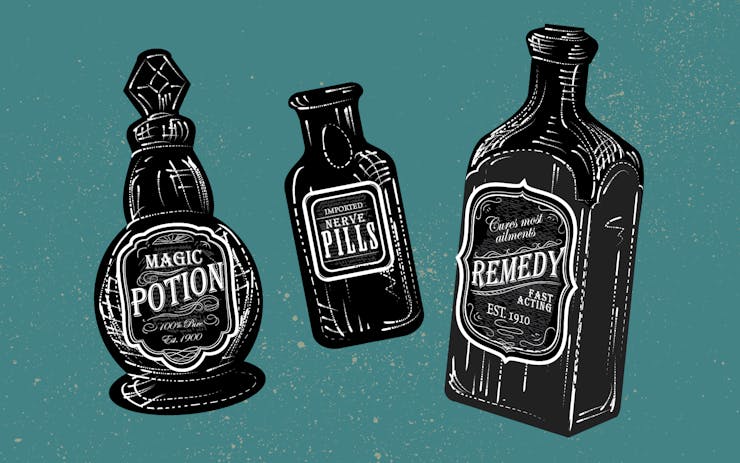B12 deficiency nearly caused my death in 2015; did you have any idea that’s something to worry about? Like me four years ago, you probably didn’t—and it’s largely due to a fellow known as “Dr. Feelgood.” This charlatan popularized B12 in the 1960s, administering it in a decidedly not-medical fashion, giving it to those without a deficiency because of the energy boost it offered, often combining it with intoxicants and other substances.
CBD has become a trend before scientists have even fully figured out how it works with our bodies.
This eventually led to it culturally being thought of as a “snake oil,” or basically worthless and unnecessary medicine—which had unfortunate and severe effects on how it’s now treated by the medical community at large. And this happened despite the 1934 Nobel Prize in Medicine being awarded to the man who stopped the formerly frequent deaths of the deficiency, then known as pernicious anemia.
In our culture, we like things simple. Even though B12 deficiency was an extremely common cause of death a mere century ago, doctors are now hardly taught about it; they’re not even taught to screen for it correctly, and often not testing even serum levels unless they see anemia, a late-stage symptom that doesn’t happen in everyone.
Let’s talk about what this means for cannabis. CBD, or cannabidiol, is trendy. So trendy, it’s showing up at dinner parties, high-end juice bars, even Carl’s Jr.—and it’s at risk of falling into the same fate as B12.
The Big Deal
Within each and every one of us is a system of receptors that interact with cannabis, allowing us to experience its pleasurable and therapeutic effects. It’s called the endocannabinoid system, or ECS for short. Yet most doctors haven’t been taught about the endocannabinoid system at all, ever.
Despite the willful ignorance of the medical field in this regard, experts have been studying the ECS for nearly 30 years, understanding that it acts as a balancing force in all of the other bodily systems. Put simply, the ECS is an important biological network that medical professionals have yet to fully understand.
What if the result of CBD-mania could be that the medical prowess of the ECS, and the cannabinoids that interact with it, aren’t ever taken seriously?
Because it interacts with the other bodily systems to help achieve homeostasis (or balance), when the ECS isn’t functioning properly, it may affect the body in a multitude of ways, and often in a severe manner.
This is also why cannabinoids like CBD are such medical powerhouses—because they can help the ECS function when it can’t produce enough endocannabinoids (the cannabinoid-like compounds our body naturally produces) to run properly. Different cannabinoids in cannabis work with the ECS in a multitude of ways, empowering it to aid the cacophony of symptoms that can be caused by ECS imbalance.
The “Dr. Feelgoods” of CBD
By way of its effects on the ECS, CBD is a serious subject, and the way it’s regarded has very real implications. All of us need to start treating it appropriately, but especially medical professionals and those profiting from CBD.Since the passing of the Farm Bill, CBD has completed saturated our culture—and the pyramid schemes, ice cream flavors, and sketchy (untested!) products from random websites are affecting the way CBD is viewed.
The stigma around cannabis has already led to a major bodily system being largely ignored by the people who are responsible for protecting our health. CBD has become a trend before scientists have even fully figured out how it works with our bodies.
In our culture, if people think something is irrelevant, history has shown that it will be treated as so, regardless of overwhelming facts to the contrary. Even though the ECS was discovered in the early 90’s, its relation to a stigmatized plant means that it’s been ignored. Our nation has been swept up in the miraculous power of a cannabinoid without even really knowing what it is, or that there’s many more of them waiting to be studied and benefited from.
CBD has already proven to be an important medicine for serious conditions. But if we keep treating CBD with all the relevance of a fidget spinner, it’s hard to imagine that the dinosaur pace of cannabis science will hasten. This means that the lack of an even rudimentary test for endocannabinoid deficiency or dysfunction will persist, and people will continue to be diagnosed with “incurable” and misunderstood diseases—and still suffer the symptoms.





